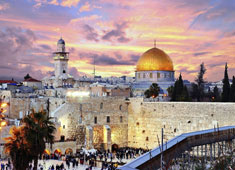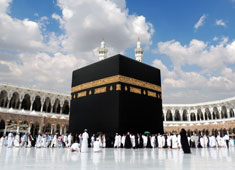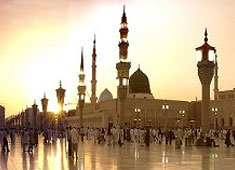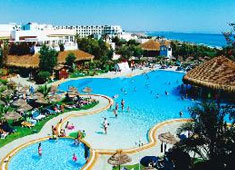A Practical Guide to Hajj
 Practical guide
Practical guide
Getting body and spirit ready:
Prepare your Body:
It is important to draw your attention towards the physical difficulties which, as pilgrims, you are going to face during your pilgrimage. We repetitively warn you about the necessity of performing this duty when you still young and healthy. It is a long and hard journey during which your should be patient.
However, one thing is certain: whatever misadventures you’re told, nothing should prevent you from answering to the call of the Almighty to full fill your religious duty.
“ If GOD invites me, I shall not refuse this invitation.”
Despite the difficulty of this mission, nothing compares to the loveliness of heading to the Holy Land. You can enjoy your spiritual journey at most. You just need to be physically AND morally well-prepared.
One month before, make a good magnesium therapy. You can also try other mixtures prescribed by your doctor or by your grandmother who would be the best to tell what kind of food to consume to prepare one’s body for a long lasting endeavor.
It is always recommended that you keep on you some sportsmen cereal bars, as well as some sweets (chocolate bars, candies, sugar lumps…etc.). This will be useful in case you would have any discomfort (hypoglycemia), you or any of the other accompanying pilgrims.
You need to know that we sleep very little in performing one's pilgrimage.
We sacrifice one’s sleep in favor of taking ample advantages from our journey.
Have your fill of sleeping before leaving, but do not overdo. If you get used to sleeping too much, you will not be able to get up early for the prayers once in Hajj or Umrah. In addition, the few hours of sleep you will be limited to will never be enough.
If you are used to sleep 10 hours a day and to take your car to buy some bread at the corner, you are not really ready for the efforts which you will be making during your Hajj or Umrah.
It is crucial to properly adapt one’s body to physical effort before undertaking such a challenging journey.
You need to consider this preparation several weeks in advance. However, you do not need huge efforts; few small exercises will do.
Get used to walk ( half an hour a day would be a good custom). Season your body to a little more effort and perseverance.
It is essential to visit your doctor before leaving to Mecca. The latter will advise you on the precautions to employ and medicines to take in your first-aid kit. The doctor will also make full assessment to determine whether your physical situation allows you to carry out the pilgrimage or not.
A visit to the dentist should also be paid, because a raging toothache or badly looked after caries, would be a misfortune during Tawaf.
Women are advised go to the gynecologist to help them take the necessary precautions not to have their menstruations during the rites.
Already required for the visa, vaccines protect your body against diseases and infections which could be easily caught due to direct contact with pilgrims coming around the world.
Children too, need to update all the vaccinations according to their age in the immunization schedule.
Prepare your Spirit:
The pilgrimage is a spiritual journey. To fully fulfill this journey, it is essential to have sincere intentions towards God in Hajj or Umrah, and to perform all the actions according to Sunna (tradition of the Prophet ).
You need to acquire knowledge of:
1-The rites:
For those who wish to carry out the Hajj or Omra, we highly recommend that you study the rites of pilgrimage Following the the Quran’s and Sunna’s rules to avoid any ambiguity. (See the section ‘the Rites of Hajj and Omra’.)
2-The invocations:
Try to learn by heart the invocations to utter in every place and in every situation. You are allowed to read the invocations from a small book, yet, it is preferable to know them by heart so as to be more focused on the invocation itself.
3-The verses of the Quran:
In the same line of thought, it is more worthy to pray with Suras of your own choice and which include more than three lines
4-Community life:
Every Muslim is supposed to acquire a minimum of knowledge of his/her own religion.
This spiritual journey will be a very good occasion for you to expand your knowledge of the main lines of Islam, its history, the Holy Places. You will not have a better opportunity.
The pilgrimage to Mecca will expose you to a real intimacy with the other pilgrims; you all will share meals, rites, prayers, and even hotel rooms.
It is important to learn to cohabit with other Muslims. You need to be more helpful and more friendly.
Do not hesitate to give way to the oldest, share information which the others need, give advice, be pleasant, etc.
The pilgrimage to Mecca is compulsory only when one is fully healthy and wealthy enough to perform this rite without any debts or loans.
The pilgrim must also ensure that the expenses of his/her Hajj or Umrah come from lawful and honestly earned revenues.
GO-Makkah's Advice:
Some drugs can cause allergic effects in the sun! If you are having a long-lasting treatment, please seek your doctor’s advice.
- Remember that 90 % of the rites of the pilgrimage are invocations (during Al Tawaf, Al Saayi, Arafat, etc.). It would be useful to prepare them beforehand.
The risks and the precautions
Here are some safety mesures to respect during your pilgrimage:
- In the desert (Mina, Muzdalifah, Arafat), avoid walking barefoot and lying directly on the ground. To avoid germs, always think of a groundsheet.
- Avoid any contact with animals, even the domestic ones: rabies is wide-spread worldwide. Even though its main vectors are the dogs, all mammals (cats, monkeys, bats, fennecs, camels…) can transmit the virus responsible for the disease. This is contained in the animal’s saliva. The transmission can be made not only through biting or scratching, but also through licking a wound, however slight, or through contacting the saliva with a mucous membrane ( projection in the eye or in the mouth).
- Protect yourselves from insect bites. Apply a repellent on the exposed parts of the body and wear long-sleeved clothes (if you are not in Ihram).
- Take time to rest on arrival and between the stages of your pilgrimage.
- Be careful with strong and extended physical efforts under hot weather.
- Protect yourself from the sun by wearing a hat, sunglasses, lightweight clothes made with clear-colored-natural fibers; and by applying sun filter cream on the exposed skin (When you are not in Ihram).
- Avoid "The Rawda", in Medina, during the day. The best time to go is between 10 p.m. and midnight.
- Be careful with beggars. Try to distinguish the "real” needy from the swindlers who come with ready speech.
- Mind the stones during the stoning ritual, even though, the authorities are taking more and more effective measures to assure this zone during the pilgrimage.
Go-Makkah’s Advice in case you got bitten by an insect, an animal, etc…:
* Before seeing the doctor, there are few simple things to do:
- Wash the skin wound with water and soap.
- Rinse thoroughly.
- Apply an antiseptic.
* Several serious diseases are transmitted by insects, which can sting either in the evening, at night, or even during the day.
After your return from the pilgrimage
You have to see your doctor or consult the nearest emergency department to your home at the slightest discomfort, especially in case of fever, headache, neck stiffness, nausea and vomiting.
Further information on health precautions to be taken while travelling is available on the Pasteur Institute website.
Useful links
http://www.moh.gov.sa/english/index.php
http://wiki.answers.com/Q/List_of_hospitals_in_Saudi_Arabia_and_their_address
http://www.international-medical-insurance.com/country/saudi-arabia/hospitals.php
Click Here to read the Hajj and Umrah latest news













 TUNIS
TUNIS Casablanca
Casablanca




 France
France Morocco
Morocco Saudi Arabia
Saudi Arabia Tunisia
Tunisia